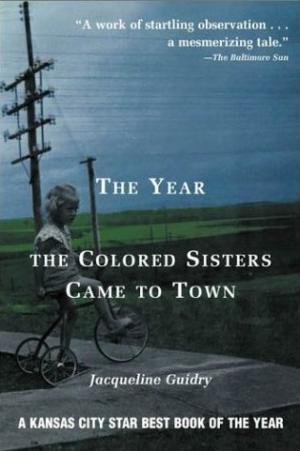
The Year the Colored Sisters Came to Town

ISBN 9781566492560 (paperback)
Published in August 2003
“Willow shade, fig picking, southern heat, and rain on a tin roof all set the stage for understanding the passion that rules change in Southern relations. Jacqueline Guidry's first novel possesses lush, old-style Southern story-telling, rich character development and powerful sense of place that is best understood through a family's struggle to do the best that they can with what they know.”
-Judith Bader Jones
Southwestern Louisiana, rural Cajun country, 1957. Vivien Leigh Dubois, a precocious and curious ten-year-old girl, and her family lead a modest and contented life filled with age-old traditions such as picking figs and making preserves. Their black housekeeper, Aussie Arceneaux, has been their faithful friend since Vivien Leigh's mother was a child, and her daughter Marydale and Vivien Leigh's seven-year-old sister Mavis are practically inseparable. But when the two of Ville d;Angelle is jolted by the arrival of two black nuns to teach at Holy Rosary, the all-white Catholic elementary school, Vivien Leigh and Mavis are exposed to an unwarranted hatred and fear that they never knew existed. Their father leads a “Concerned Citizens” group to protest and challenge the new teachers; even her mother begins to reject the lifelong friendship of the Arceneaux family. For the first time in her young life, Vivien Leigh is obliged to consider the color of people's skin and the impact of race on the very fabric of society, from the most intimate to the most public.
Reminiscent of To Kill a Mockingbird, The Year the Colored Sisters Came to Town shines a fierce light on the effects of racism in a corner of Louisiana and, by doing so, illuminates the heavy price paid for bigotry. Jacqueline Guidry's solemn, absorbing debut novel emphasizes once again that the segregation of one segment of community from another, whether that separation is the result of class or color or cultural identity, exacts a cost which no one can afford.
JACQUELINE GUIDRY, a Louisiana Cajun, has written short fiction and personal essays which have appeared in a variety of both commercial and literary publications including Reader's Digest, Buffalo Spree, St. Anthony Messenger, Whetstone, Yemassee, and the Chattahoochee Review. She also practices law, specializing in Social Security disability cases, and serves as a fiction editor for Potpourri, a literary magazine.
-Judith Bader Jones
Southwestern Louisiana, rural Cajun country, 1957. Vivien Leigh Dubois, a precocious and curious ten-year-old girl, and her family lead a modest and contented life filled with age-old traditions such as picking figs and making preserves. Their black housekeeper, Aussie Arceneaux, has been their faithful friend since Vivien Leigh's mother was a child, and her daughter Marydale and Vivien Leigh's seven-year-old sister Mavis are practically inseparable. But when the two of Ville d;Angelle is jolted by the arrival of two black nuns to teach at Holy Rosary, the all-white Catholic elementary school, Vivien Leigh and Mavis are exposed to an unwarranted hatred and fear that they never knew existed. Their father leads a “Concerned Citizens” group to protest and challenge the new teachers; even her mother begins to reject the lifelong friendship of the Arceneaux family. For the first time in her young life, Vivien Leigh is obliged to consider the color of people's skin and the impact of race on the very fabric of society, from the most intimate to the most public.
Reminiscent of To Kill a Mockingbird, The Year the Colored Sisters Came to Town shines a fierce light on the effects of racism in a corner of Louisiana and, by doing so, illuminates the heavy price paid for bigotry. Jacqueline Guidry's solemn, absorbing debut novel emphasizes once again that the segregation of one segment of community from another, whether that separation is the result of class or color or cultural identity, exacts a cost which no one can afford.
JACQUELINE GUIDRY, a Louisiana Cajun, has written short fiction and personal essays which have appeared in a variety of both commercial and literary publications including Reader's Digest, Buffalo Spree, St. Anthony Messenger, Whetstone, Yemassee, and the Chattahoochee Review. She also practices law, specializing in Social Security disability cases, and serves as a fiction editor for Potpourri, a literary magazine.